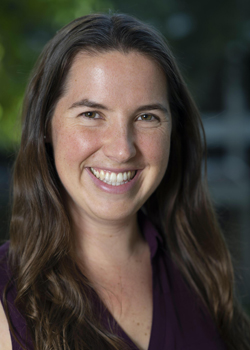
The most prestigious awards in support of early career faculty by the National Science Foundation (NSF) were granted to two faculty members from the University of Hawaiʻi at Mānoa School of Ocean and Earth Science and Technology (SOEST).
Alison Nugent and Malte Stuecker were selected for NSF‘s Faculty Early Career Development (CAREER) Program.
Alison Nugent
Nugent, an assistant professor of atmospheric sciences, was awarded nearly $900,000 for her project to investigate the role of wind, waves, and other atmospheric and oceanic properties in the production of sea salt aerosol in coastal environments of three Pacific islands. Sea salt aerosol are natural particles suspended in the atmosphere, formed at the ocean surface from breaking waves and bursting bubbles.
Despite their small size, sea salt aerosol are important in the marine atmosphere as they impact phenomena, including solar radiation and cloud formation—both key controllers of Earth’s climate, and important for understanding future climate changes. However, due to scientists’ incomplete understanding of the sizes and number of particles produced by breaking waves, especially in coastal regions, it is difficult to assess their impacts.
Using 3D-printed instruments that Nugent and her team designed and built, they will sample the sea salt aerosol size distribution—the number and size of salt particles in the atmosphere—under a variety of environmental conditions and locations to measure the production along coastlines. In addition, Nugent and her UH Mānoa students will create 3D-printed weather stations and install them in area schools on Oʻahu. Training workshops will be provided on two additional Pacific islands to jumpstart cyberinfrastructure and enhance atmospheric monitoring on remote islands.
“Using high-quality, low-cost, hand-made instrumentation allows for this work to be accessible and engaging for students in a unique way, highlighting the role of curiosity, problem solving, and hands-on methodology from start to finish,” said Nugent.
Malte Stuecker

Stuecker, an assistant professor in oceanography and the International Pacific Research Center, was awarded more than $710,000 for his project aimed at understanding the local and remote drivers of regional climate change. The warming effect of greenhouse gasses is global but not uniform over the globe, and regional differences in warming have important consequences for climate change impacts and adaptation efforts. Despite considerable research, a clear understanding of what pattern of warming will materialize and which factors determine it has not yet emerged.
With the new funding, Stuecker will assess the warming pattern using a suite of climate model experiments to identify the mechanisms that influence where and how much the surface ocean warms and how it changes over time. He will also consider how the warming pattern may influence rainfall around the world.
“I look forward to doing research that will reduce the uncertainties associated with regional climate change,” said Stuecker. “And I am very grateful that I will have the opportunity to deeply investigate the mechanisms of regional climate change.”
Through this project, Stuecker will also host workshops for students to develop scientific visualizations to explain climate change impacts relevant to Hawaiʻi. The visualizations, also known as infographics, will be developed with consideration of community concerns regarding climate change. The resulting infographics will be distributed throughout Hawaiʻi to help increase science literacy.
This award is an example of UH Mānoa’s goal of Excellence in Research: Advancing the Research and Creative Work Enterprise (PDF) and Building a Sustainable and Resilient Campus Environment: Within the Global Sustainability and Climate Resilience Movement (PDF), two of four goals identified in the 2015–25 Strategic Plan (PDF), updated in December 2020.
For more information on Nugent and Stuecker, see SOEST’s website.
–By Marcie Grabowski

